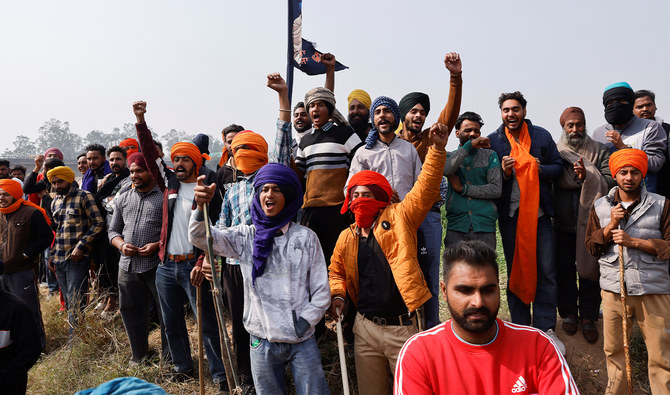NEW DELHI: Indian farmers who have been protesting for a week to demand guaranteed crop prices have rejected a proposal from the government, and say they will continue their march to the capital New Delhi.
The protesting farmers began their march last week, but their efforts to reach the city have been blocked by authorities, who have used tear gas and heavily barricaded entry points into the capital to avoid a repeat of 2021 farmer protests when they camped on the outskirts for over a year.
Late Monday night, farm leaders said they refused the government’s offer of a five-year contract for guaranteed prices for a set of crops, including pulses, maize and cotton.
The government’s proposal made Sunday was “not in the interest of farmers,” Jagjit Singh Dallewal, one of the leaders spearheading the protest, told the Press Trust of India news agency.
He added that the farmers — tens of thousands of whom have been camping out some 200 kilometers (120 miles) from the capital as they waited for the government offer — will resume their march to New Delhi on Wednesday.
“We appeal to the government to either resolve our issues or remove barricades and allow us to proceed to Delhi to protest peacefully,” Dallewal said.
The protests renewed a movement from over two years ago, in which tens of thousands of farmers hunkered down on the edges of New Delhi for over a year against agriculture laws which the government ended up repealing.
This time, the farmers who rode on tractors from neighboring Haryana and Punjab states say the government has failed to make progress on other key demands from the previous protests.
At the heart of the latest protests is a demand for legislation that would guarantee minimum support prices for all farm produce.
Currently, the government protects agricultural producers against any sharp fall in farm prices by setting a minimum purchase price for certain essential crops, a system that was introduced in the 1960s to help shore up food reserves and prevent shortages.
The farmers say a guaranteed minimum support price for their crops would stabilize their incomes. They are also pressing the government to follow through on promises to double their income, waive their loans and withdraw legal cases brought against them during the earlier 2021 protests.
Several meetings between farm leaders and the government have failed to end the deadlock. Piyush Goyal, one of the ministers negotiating with the farmers, told PTI that some of the demands of the farmers were “deep and policy-driven,” which made it more difficult to find a resolution.
The protests come at a crucial time for India, where national elections are expected in the coming months and Prime Minister Narendra Modi’s party is widely expected to secure a third successive term.
Farmers are particularly important to Modi’s base. Northern Haryana and a few other states with substantial farmer populations are ruled by his Bharatiya Janata Party.


























